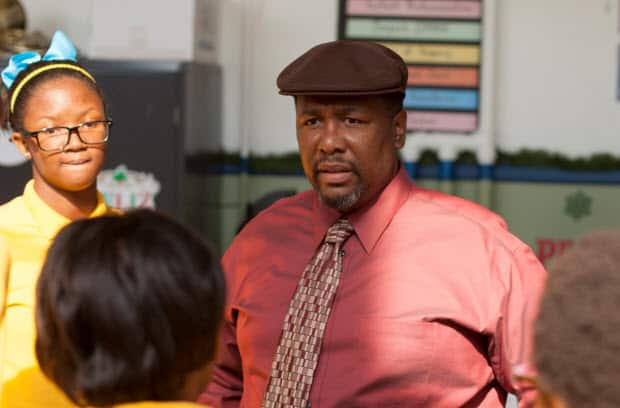
From the opening scene, death looms over “This City” in every scene, be it the death of a person, a career, or an ideology once subscribed to. Always a scathing show, “This City” might be the single most depressing episode of Treme ever produced, an hour full of long shadows punctuated by a number of quick, energetic musical sequences — an audio reminder that even when the heartbeat of one stops, the heartbeat of a million others continue on. After all, death is just another ordinary thing, right?
As he often is, Albert is the thematic core of “This City”: even when faced with the death of something cherished (in this case, his life), there’s no reason to go into the dark night angry or sad. Like the city he lives in, Albert’s fought the long fight, from the times he describes in the pre-integration days to the present. This idea plays out in numerous forms throughout the episode, most prominently with Toni, whose battle against Wilson and the atrocities of the New Orleans Police Department are starting to weigh on her in ways they never have before.
The stakes may be a bit different (Albert’s been given his own death certificate, while Toni is facing frustrating social inefficiencies), but the idea is the same; when we see the death of something we believe in, being nostalgic for the old, simpler days becomes easier. When Toni could believe in a corrupt system, she was able to make a living doing something she had faith in: even if things got messed up somewhere, she always believed justice would pull through. With Officer Wilson (who openly berates her while she eats lunch at Dizzy’s), Toni can project those long-standing frustrations onto something physical, a beacon of evidence that proves just how corrupt a system she’s trying to fight. Like Albert, she’s trying to fight something that’s already become such an integral infection: it’s too late to try and fix the N.O. justice system the way it exists. Through this parallel, Treme suggests there’s no amount of political chemotherapy that can redeem Toni’s wasted efforts or ease the pain of Bill’s family — just like there’s no amount of chemo that can save Albert.
This kind of social critique is the kind Treme hangs its hat on: its socio-political nihilism is a badge it wears proudly, even acknowledging the flaws in its own logic, through other characters like Annie and Davis, two characters learning the value (and difficulty) of staying loyal to something, be it a backup band or a ideological cause. At the end of the day, we all want to be successful: but for creative types, ambition often comes hand-in-hand with sacrifice, forcing both Annie and Davis into making tough professional decisions (decisions that are also deeply personal to both of them, I might add). Davis might not want to be a “liaison” for the dirty corporate succubi (just as Annie wants to reject the sound business ideas of her own professional succubus), but as Annie’s friend points out, it’s foolish to piss away the opportunities we’re given, even those that challenge long-standing loyalties.
Noticing a pattern here? With all the revolving story lines being compressed into five episodes, Treme takes advantage of its many narratives by pairing them up thematically: the trend continues with Janette and Ladonna fighting for their namesake (Ladonna’s children, and Janette’s last name as part of her business), being greeted with scornful, spiteful glances from the men they’re trying to appease to. Both Janette and Ladonna approach Tim and Larry (respectively) in the kindest way possible, trying to step around the own truths they don’t want to face (in short, they both made mistakes) to get what they want.
Those are obviously not two story lines heavily focused on the “death” of something as the rest of the episode (except the death of Desautel’s as Janette’s brand), but there’s still an interesting connection to be made to the other paired stories in “This City”: when things go sideways, the only thing we can do is hold onto what we love. It might be an instrument, a lover, or the fantastical version of a city long gone — but we’ve all got something to keep us moving, to keep us making decisions and moving forward, even when everything appears fundamentally broken.
It’s the charm of New Orleans: through the corruption and devastation, the music and passion carries on: except when it’s the death of a child, of course, something Treme doesn’t even want to celebrate (Antoine tells the band members who brought instruments to Shareese’s wake not to play… “Not tonight”). Something things just aren’t reconcilable: be it a deadly case of mistaken identity, Toni’s inability to get the federal government to do anything to fix New Orleans, or a cancer that just won’t quiet, there are going to be moments in life when we’re faced with things that shake our beliefs to the very core. Where do we turn to then? Look to the Lambreaux family for answers: find the one you love, and do the things you love to do.
Other thoughts/observations:
– Albert thinks he’s having a grandson: “You have to.”
– I didn’t talk much about Antoine and all the death he deals with in this episode — it’s so hard to watch Antoine, a man always known for his smile, break down emotionally like that. It shows just how much of a “growth spurt” he’s really had.
– I wish I could post Davis and Janette’s nicknames for Tim, because they’re all hilarious.
– FEMA money at OPP was spent on tech, not general improvements… surprise!
– Davis’s eyes lighting up at the mention of a $30,000 paycheck = priceless.
– Albert, to Ladonna: “Thank you. For all this. For everything.”
[Photo via Paul Schiraldi/HBO]
 Follow Us
Follow Us

